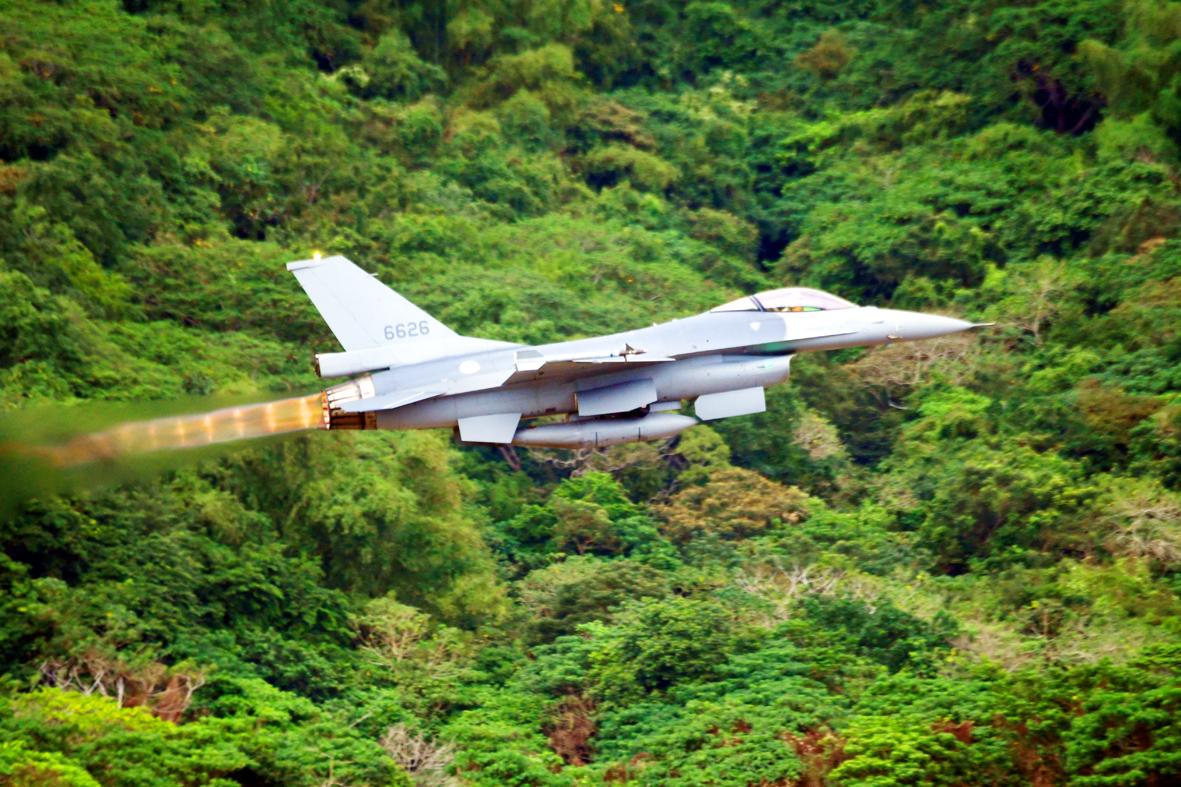The government budget for fiscal 2021 could see national defense spending increase to NT$335.8 billion (US$11.36 billion), up NT$10 billion, or 3 percent, from fiscal 2020, sources said on Friday.
If the NT$29 billion in special funding to purchase F-16 jets from the US were included, the increase in the national defense budget would be 7 percent, the sources said, adding that the military’s purchase of 66 F-16s is expected to cost NT$247.29 billion and be paid off in seven years.
The Ministry of National Defense is discussing with the Executive Yuan additional funding to purchase advanced weaponry, they said.

Photo: You Tai-lang, Taipei Times
Premier Su Tseng-chang (蘇貞昌) next month is expected to present President Tsai Ing-wen (蔡英文) with the final Directorate-General of Budget, Accounting and Statistics (DGBAS) estimate on the government’s fiscal 2021 budget, they said, adding that the final decision would be made pending a discussion between the two.
Equipment purchases, and maintenance and personnel fees comprise the main expenditures in the defense budget, although details cannot be divulged, an Executive Yuan source said.
An official speaking on condition of anonymity said that the increase in the defense budget would be within normal parameters, as an exponential increase would breach the Budget Act (預算法).
The public construction budget for fiscal 2021, including a second-phase infusion into the Forward-looking Infrastructure Development Program, and other funds for state-owned enterprises and a non-profit businesses fund, is estimated to be NT$500 billion, a 10 percent rise from fiscal 2020, sources said.
Flagship projects include the Ministry of Economic Affairs’ Circular Economy Industrial Park and the Ministry of Transportation and Communications’ third terminal project at Taiwan Taoyuan International Airport, the sources said.
Research and development for technology might comprise 3 percent of public construction expenditure, they said.
Tax revenue for fiscal 2021, estimated at NT$2 trillion, down NT$100 billion from fiscal 2020 due to the COVID-19 pandemic, might lead to a deficit, the DGBAS said.
In the event of a deficit, the government would have to take on debt, DGBAS Director-General Chu Tzer-ming (朱澤民) said.

LONG FLIGHT: The jets would be flown by US pilots, with Taiwanese copilots in the two-seat F-16D variant to help familiarize them with the aircraft, the source said The US is expected to fly 10 Lockheed Martin F-16C/D Block 70/72 jets to Taiwan over the coming months to fulfill a long-awaited order of 66 aircraft, a defense official said yesterday. Word that the first batch of the jets would be delivered soon was welcome news to Taiwan, which has become concerned about delays in the delivery of US arms amid rising military tensions with China. Speaking on condition of anonymity, the official said the initial tranche of the nation’s F-16s are rolling off assembly lines in the US and would be flown under their own power to Taiwan by way

‘OF COURSE A COUNTRY’: The president outlined that Taiwan has all the necessary features of a nation, including citizens, land, government and sovereignty President William Lai (賴清德) discussed the meaning of “nation” during a speech in New Taipei City last night, emphasizing that Taiwan is a country as he condemned China’s misinterpretation of UN Resolution 2758. The speech was the first in a series of 10 that Lai is scheduled to give across Taiwan. It is the responsibility of Taiwanese citizens to stand united to defend their national sovereignty, democracy, liberty, way of life and the future of the next generation, Lai said. This is the most important legacy the people of this era could pass on to future generations, he said. Lai went on to discuss

MISSION: The Indo-Pacific region is ‘the priority theater,’ where the task of deterrence extends across the entire region, including Taiwan, the US Pacific Fleet commander said The US Navy’s “mission of deterrence” in the Indo-Pacific theater applies to Taiwan, Pacific Fleet Commander Admiral Stephen Koehler told the South China Sea Conference on Tuesday. The conference, organized by the Center for Strategic and International Studies (CSIS), is an international platform for senior officials and experts from countries with security interests in the region. “The Pacific Fleet’s mission is to deter aggression across the Western Pacific, together with our allies and partners, and to prevail in combat if necessary, Koehler said in the event’s keynote speech. “That mission of deterrence applies regionwide — including the South China Sea and Taiwan,” he

UNPRECEDENTED: In addition to the approved recall motions, cases such as Ma Wen-chun’s in Nantou are still under review, while others lack enough signatures The Central Election Commission (CEC) announced yesterday that a recall vote would take place on July 26, after it approved the first batch of recall motions targeting 24 Chinese Nationalist Party (KMT) lawmakers and Hsinchu Mayor Ann Kao (高虹安). Taiwan is in the midst of an unprecedented wave of mass recall campaigns, following a civil society push that echoed a call made by Democratic Progressive Party (DPP) caucus whip Ker Chien-ming (柯建銘) in January to initiate signature drives aimed at unseating KMT legislators. Under the Civil Servants Election and Recall Act (公職人員選舉罷免法), Taiwanese can initiate a recall of district-elected lawmakers by collecting